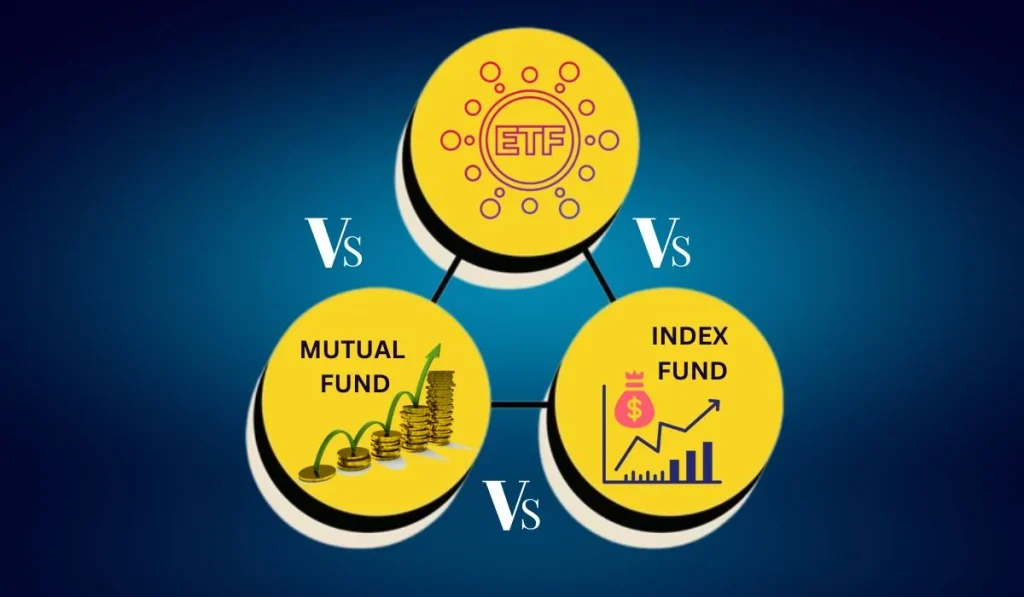The ETF, Index fund, and mutual funds are all different types of investment funds that have the potential to earn you profit. An investment fund is nothing but a pool of money that several people come together to buy. Here, each individual buys their share and has complete control over them. They are put together by different contributors to provide a diversified trading experience for traders and investors. In this article, we will look into three types of investment funds: ETFs, index funds, and mutual funds, and also the things that differentiate them from each other.
ETFs: What It Is & How It Works
ETFs are a type of investment fund in which the user can gain exposure to various assets like bonds and cryptos without actually owning them. In this, a number of assets are clustered into a pool and are then offered to be traded to be traded on traditional exchanges in the form of ETFs. This allows the users to invest in the ETF rather than investing in the underlying assets and then constantly worrying about price fluctuations.
At first, the ETF purchases the assets from other exchanges or through a direct transfer from the counterparty. After the successful transfer of the assets, they are pooled and stored securely by some third-party individual or organization to ensure their safekeeping and to prevent any unauthorized access. Then they are traded in a number of exchanges as individual stocks while staying related to the underlying assets they track.

Index Fund: What It Is & How It Works
Index funds are a type of investing fund or ETF that track the performance of a market index like the S&P 500 or the Nasdaq 100. A market index is a specific tool that tracks the performance of a specific group of securities like a stock or bond. In other words, an index fund imitates a particular stock market index like NSE Nifty, BSE Sensex, etc.
Index funds employ a passive management strategy, which is a strategy that involves a portfolio and then generating returns that are exactly similar to that of the tracked portfolio. This involves buying the shares of a lot of companies to match the performance of that portfolio. As these funds hold a wide variety of stocks, the risks associated with them are also that much lower.
Mutual Funds: What It Is & How It Works
A mutual fund is a type of investment fund where a company raises money from multiple investors to buy a wide range of assets in the market, such as bonds, stocks, and so on. The fund’s investments are mostly made by the opinion of its managers. Investors buy the shares of this raised fund, which represents the portion of the assets they bought and also its income.
Mutual funds offer a wide range of assets and hence the risk associated with them is comparatively less. There is also the fact that the investment decisions are all made by experienced and seasoned managers, you need not worry about making major investment decisions and the price fluctuations that are associated with different assets. Another major advantage is the liquidity factor, it allows investors to easily sell and buy their shares.
ETF Vs Index Fund Vs Mutual Fund
| Properties | ETF | Index Fund | Mutual Fund |
| Trading | ETFs trade throughout the day | Index Fund trade once a day after the market closes | Mutual Funds trade also once a day after the closure of the market |
| Management | Passive managed | Passively managed | Actively managed |
| Fees | ETFs charge less than Mutual Funds | Index Funds charge less than Mutual Funds and ETFs | Mutual Funds charge more than Index Funds and ETFs |
| Composition | ETFs are a collection of assets that are already bought by the associated institution | Index Funds are designed to imitate the performance of a certain list of underlying assets | Mutual Funds combine the money from their investors and then proceed to invest in other assets in the market |
| Tax | More tax efficient than mutual funds & Mutual Funds | Index Funds are more tax-efficient when compared to others | Mutual Funds are less tax-efficient than ETFs and Index Funds |
| Minimum Investment | ETFs have no minimum investment beyond the price of a share | Minimum investment is there and is dependent on the broker’s policies or underlying assets | Minimum investment in Mutual Funds also varies by fund and the type of investment you’re going to make |
| Risk | Less Risk | Less Risk | Unsystematic Risk |
Final Remarks
Each of these investment strategies has the potential to gain you a profit. While index funds are somewhat famous among investors seeking a low-cost, diversified investment that is ideal for long-term investment, ETFs are ideal for traders who are looking to make a profit in the short term. Traders can use the price fluctuation of underlying assets to cut and earn a profit during the day. Also, they are more tax-efficient than other types of investments and have considerably fewer risks associated with them. So, if you’re considering investing and are thinking about which investment fund to choose, consider the above-given information and conduct thorough research on your own before deciding on one.






